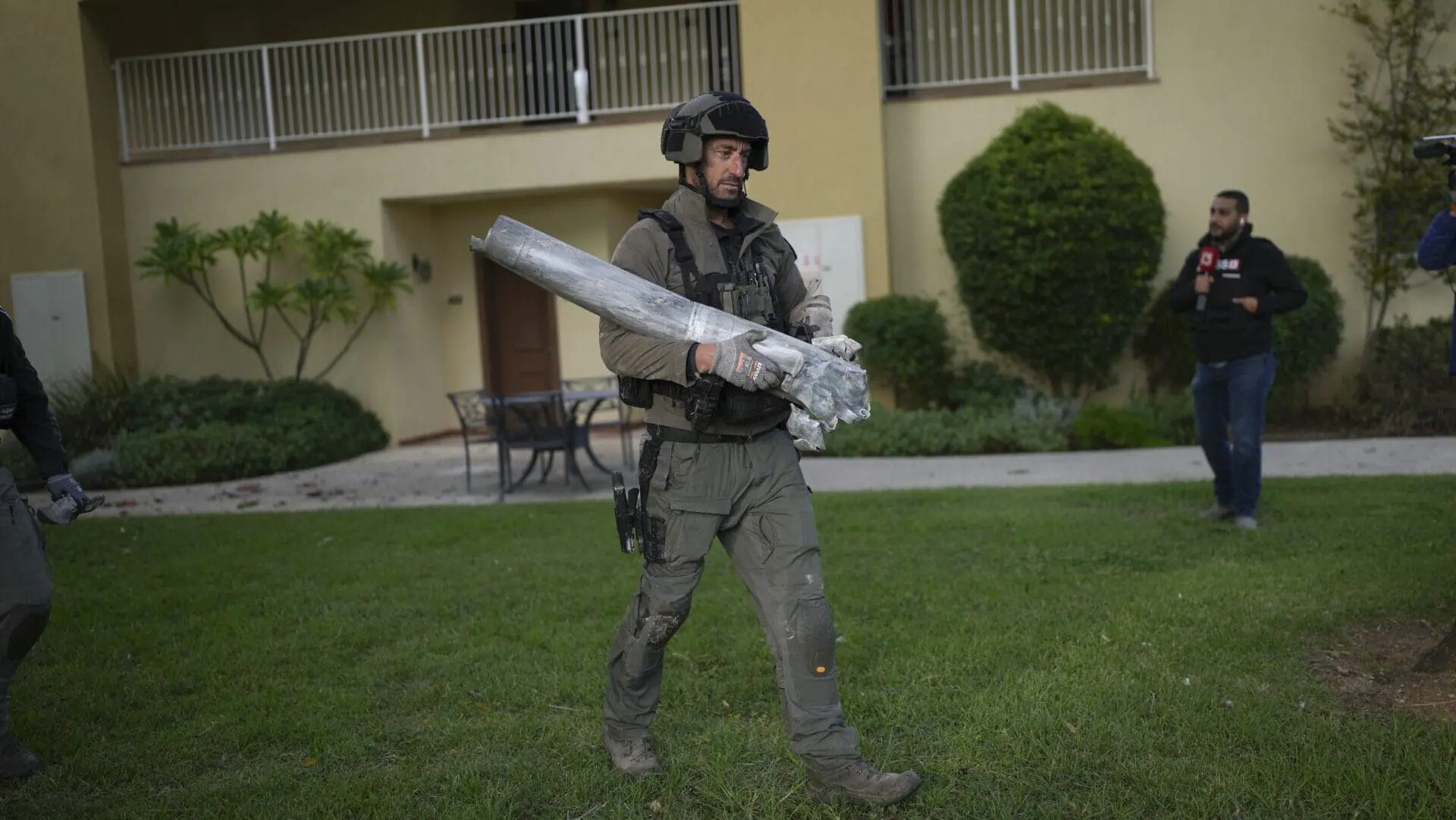Hezbollah fires about 250 rockets and other projectiles into Israel in heaviest barrage in weeks
BEIRUT (AP) — Hezbollah fired about 250 rockets and other projectiles into Israel on Sunday, wounding seven people in one of the militant group’s heaviest barrages in months, in response to deadly Israeli strikes in Beirut while negotiators pressed on with cease-fire efforts to halt the all-out war.
Some of the rockets reached the Tel Aviv area in the heart of Israel.
Meanwhile, an Israeli strike on an army center killed a Lebanese soldier and wounded 18 others in the southwest between Tyre and Naqoura, Lebanon’s military said. The Israeli military expressed regret, saying that the strike occurred in an area of combat against Hezbollah and that the military’s operations are directed solely against the militants.
Israeli strikes have killed over 40 Lebanese troops since the start of the war between Israel and Hezbollah, even as Lebanon’s military has largely kept to the sidelines.
Lebanon’s caretaker prime minister, Najib Mikati, condemned the latest strike as an assault on U.S.-led cease-fire efforts, calling it a “direct, bloody message rejecting all efforts and ongoing contacts” to end the war.
Hezbollah fires rockets after strikes on Beirut
Hezbollah began firing rockets, missiles and drones into Israel after Hamas’ Oct. 7, 2023, attack out of the Gaza Strip ignited the war there. Hezbollah has portrayed the attacks as an act of solidarity with the Palestinians and Hamas. Iran supports both armed groups.
Israel launched retaliatory airstrikes at Hezbollah, and in September the low-level conflict erupted into all-out war as Israel launched airstrikes across large parts of Lebanon and killed Hezbollah’s top leader, Hassan Nasrallah.
The Israeli military said about 250 projectiles were fired Sunday, with some intercepted.
Israel’s Magen David Adom rescue service said it treated seven people, including a 60-year old man in severe condition from rocket fire on northern Israel, a 23-year-old man who was lightly wounded by a blast in the central city of Petah Tikva, near Tel Aviv, and a 70-year-old woman who suffered smoke inhalation from a car that caught fire there. In Haifa, a rocket hit a residential building that police said was in danger of collapsing.
The Palestine Red Crescent reported 13 injuries it said were caused by an interceptor missile that struck several homes in Tulkarem in the West Bank. It was unclear whether injuries and damage were caused by rockets or interceptors.
Sirens wailed again in central and northern Israel hours later.
Israeli airstrikes without warning on Saturday pounded central Beirut, killing at least 29 people and wounding 67, according to Lebanon’s Health Ministry.
Smoke billowed above Beirut again Sunday with new strikes. Israel’s military said it targeted Hezbollah command centers in the southern suburbs of Dahiyeh, where the militants have a strong presence.
Israeli attacks have killed more than 3,700 people in Lebanon, according to the Health Ministry. The fighting has displaced about 1.2 million people, or a quarter of Lebanon’s population.
On the Israeli side, about 90 soldiers and nearly 50 civilians have been killed by bombardment in northern Israel and in battle following Israel’s ground invasion in early October. Around 60,000 Israelis have been displaced from the country’s north.
EU envoy calls for pressure to reach a truce
The European Union’s top diplomat called Sunday for more pressure on Israel and Hezbollah to reach a deal, saying one was “pending with a final agreement from the Israeli government.” U.S. envoy Amos Hochstein was in the region last week.
Josep Borrell spoke after meeting with Mikati and Lebanese Parliament Speaker Nabih Berri, a Hezbollah ally who has been mediating with the group. Borrell said the EU is ready to allocate 200 million euros ($208 million) to assist the Lebanese military.
But Borrell later said that he did not “see the Israeli government interested clearly in reaching an agreement for a cease-fire” and that it seemed Israel was seeking new conditions. He pointed to Israel’s refusal to accept France as a member of the international committee that would oversee the cease-fire’s implementation.
The emerging agreement would pave the way for the withdrawal of Hezbollah militants and Israeli troops from southern Lebanon below the Litani River in accordance with the U.N. Security Council resolution that ended the monthlong 2006 war. Lebanese troops would patrol with the presence of U.N. peacekeepers.
One year since the only hostage-release deal
With talks for a cease-fire and hostage release deal in Gaza stalled, freed hostages and families of those held marked a year since the war’s only hostage-release deal.
“It’s hard to hold on to hope, certainly after so long and as another winter is about to begin,” said Yifat Zailer, cousin of Shiri Bibas, who is held along with her husband and two young sons.
Around 100 hostages are still in Gaza, at least a third believed to be dead. Most of the rest of the 250 who were abducted in the Oct. 7, 2023, Hamas attack were released in last year’s cease-fire.
Talks for another deal recently had several setbacks, including the firing of Israeli Defense Minister Yoav Gallant, who pushed for a deal, and Qatar’s decision to suspend its mediation. Hamas wants Israel to end the war and withdraw all troops from Gaza. Israel has offered only to pause its offensive.
The Palestinian death toll from the war surpassed 44,000 this week, according to Gaza’s Health Ministry, which does not distinguish between civilians and combatants in its count.
On Sunday, six people were killed in strikes in central Gaza, according to AP journalists at Al-Aqsa Martyrs Hospital in Deir al-Balah.
___
Goldenberg reported from Tel Aviv, Israel.
